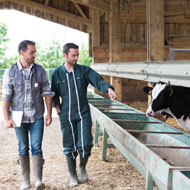
Study shows training can enhance farmer engagement
Heard health discussions with farmers are a really important part of a large animal vet's role, but the advice given does not always turn into action on the part of the farmer for all kinds of legitimate and financial reasons.
Behavioural scientist Alison Bard spoke at the SPVS/VMG congress about her current research into how a change in approach from cattle vets could increase uptake of health messages and ultimately improve dairy cattle welfare.
In particular, Alison looked at lameness and mastitis health plans and she explained that even though vets were discussing better herd health and changes with farmers, and even though farmers wanted to improve their cattle health in the vast majority of cases, often nothing was happening.
Her research has shown that most vets have a directive approach to helping and advising the farmer. With the help of some audience participation exercises, she showed that generally we all respond better if we feel that we are solving our own problems.
The vet on the farm is instinctively trying to fix problems for the farmer by telling him/her what they need to do, but actually this approach causes ambivalence in the farmer and is far more likely to make them push against change. If the vet can adopt a motivational style of interviewing by encouraging the farmer to talk through what they think they need to do to make a change and how they can achieve it there is likely to be a greater success.
Alison's research project asked three questions:-
1. How do vets currently communicate?
2. How do vets and farmers perceive communication and advice?
3. Can vets learn from motivational interviewing?
It involved recording conversations between vets and farmers, analysing the results, and providing training in motivational interviewing (MI) for the vets in the study. Vets were taught how to adopt a reflective approach when talking to the farmer, how to empathise with them and create a bond that allows a working partnership.
The results of the project have shown that the training did have an effect and enabled vets to have a greater empathetic relationship with their clients. The MI training enhanced farmer engagement who became more positive about the changes that they needed to make to improve their herd health.
The potential for improving herd health and the impact this could have on both the economic and health issues for farming is enormous.



 The Federation of Independent Veterinary Practices (FIVP) has announced a third season of its podcast, Practice Matters.
The Federation of Independent Veterinary Practices (FIVP) has announced a third season of its podcast, Practice Matters.